A Nativity among rubble to remember Gaza on the eve of Christmas in Bethlehem
Father Munther and other Christian clergy made an appeal to the White House for a ceasefire. ‘There they celebrate Christmas with presents and lights, and here they send us weapons and the machinery of war’
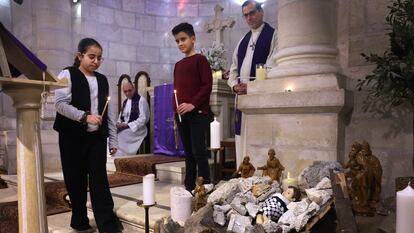
The image of the baby Jesus placed on rubble in a church in Bethlehem, in the West Bank, symbolizes a cry for peace at the gates of a wartime Christmas in Palestine. A boy and a girl light the candles surrounding this vindictive nativity scene at the beginning of a Sunday Mass, presided between songs by priest Isaac Munther. “We are all shattered by the images of children being pulled out from under the rubble,” explains the priest to justify his montage. His idea attracted attention in the international media, but only local citizens enjoy it live. The escalation of the war has scared off tourists, dealing a blow to the local economy.
Munther, 44, originally from Beit Sahour, one of the towns with a large Arab Christian population surrounding Bethlehem, recently traveled to the United States. There, among many other appointments, he delivered a letter to the White House that he had signed along with other Palestinian Christian clergy and which, he was assured, would find its way into the hands of President Joe Biden. “We wrote a letter of peace, uncontroversial, and asking for an immediate ceasefire,” he said at the end of the Eucharist. But the U.S. response was the veto last Friday of the ceasefire resolution in the United Nations Security Council, he laments with more derision than surprise. “They also replied by confirming a new arms deal with Israel. I commented on it in the sermon. There they celebrate Christmas with presents and lights, and here they send us weapons and the machinery of war,” he adds sarcastically.
After his return to the West Bank on December 1, the day on which the week-long ceasefire between Israel and Hamas came to an end, the Lutheran Christmas Church in Bethlehem, where Munther works, decided to set up the nativity scene among the rubble. The priest says he has received “messages of solidarity and support from all over the world” and that there are “churches asking permission to make posters and postcards and to put it in their Nativity scenes and calendars.”
The United Nations puts the number of children killed in Gaza during the war at over 7,500, making it the armed conflict with the highest child mortality rate of our times, with an average of 115 minors killed every day. Some sources, such as the Geneva-based Euro-Med Human Rights Monitor, place the figure at over 10,000, taking into account the bodies that remain unaccounted for in the wreckage of the bombardment. In total, the number of dead in Gaza now exceeds 18,000, according to the Ministry of Health in the Gaza Strip, which is governed by Hamas.
“If Jesus were born again today, he would be born again under the rubble in Gaza,” Munther says next to the boulders of his nativity scene. “For us, God is under the rubble. God is in the operating rooms. God is in solidarity with those who suffer injustice. So the idea of this manger arose, especially when the world continues to justify the murder and dehumanization of these children,” he adds against the bustling backdrop of the downtown Bethlehem market. Just over 1% of the 5.3 million Palestinians living in the West Bank, Gaza, and East Jerusalem are Christians, most of them Catholic and Orthodox.
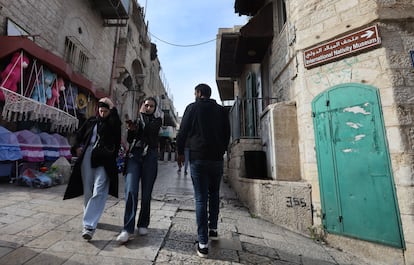
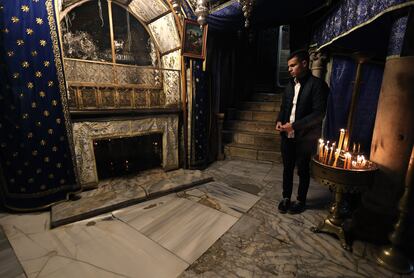
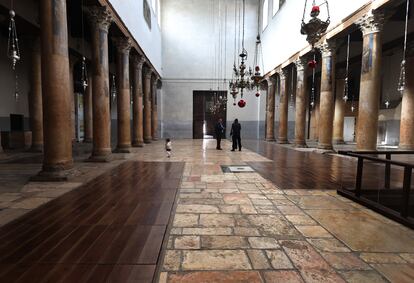
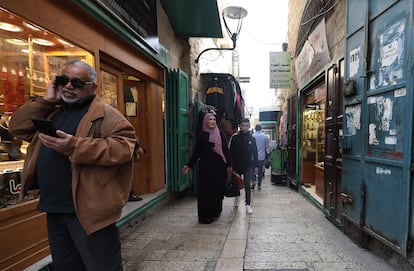
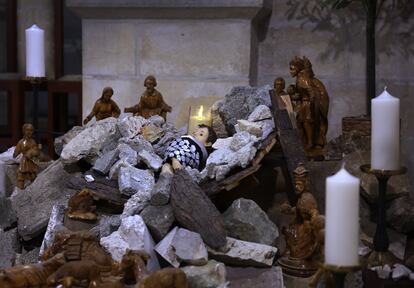
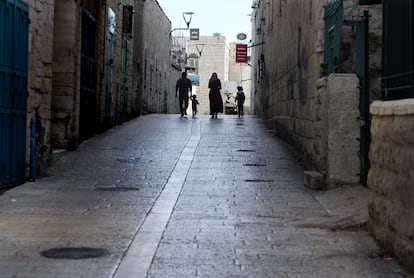
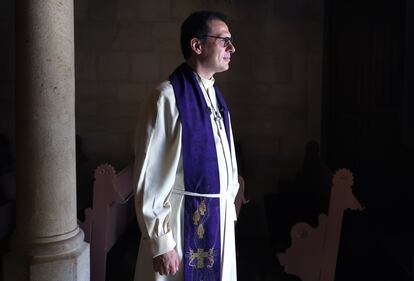
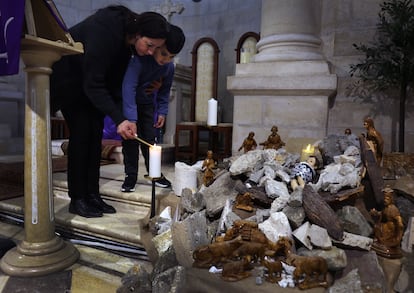
Economic hole
Half of Bethlehem’s income comes from tourists and pilgrims attracted by the Basilica of the Nativity, a World Heritage Site that Christians traditionally recognize as the site of the birth of Jesus of Nazareth. Of the 1.9 million overnight stays in the West Bank between January and September of this year, one million were in the city of Bethlehem, which also accounted for half of the 2.5 million total visitors, according to data from the Ministry of Tourism of the Palestinian National Authority (PNA). The conflict has put an end to tourism, causing an economic hole, to which must be added the 150,000 West Bankers who had work permits in Israel that have now been canceled.
The lively souk that leads to the heart of Bethlehem, the Manger Square, remains active but limited to local citizens. There are stores and stalls selling fruit and vegetables, sneakers and clothing. The cafés operate normally and vendors hawk their wares to customers wandering the streets. But none of them are foreigners. Visitors have been driven out by the war.
On Paul VI Street, which leads from the Lutheran church to Manger Square and the Basilica of the Nativity, a desperate vendor latches on to the handful of foreigners as if they were an apparition. Abud Salah, 31, runs a family business selling handicrafts, gifts, leather bags and carpets where local passersby don’t linger. This tour guide-turned-shopkeeper explains how revenues have plummeted at a time when they were just beginning to recover after the coronavirus pandemic. Now, after the struggles of 2020 and 2021, Christmas 2022 was just a mirage that has evaporated with the war.
Tourists returned en masse last year to a destination whose peak season coincides with Christmas. “There wasn’t a single vacancy in the hotels, hostels or houses,” Salah says as he presents objects with which to try to make a little cash. A few meters away, the manager of the Al Sufara establishment invites you to try the falafel, traditional chickpea croquettes, which he is frying in the same street. He also offers tea on his own initiative, surprised by the presence of foreigners, whom he asks, please, to rate his place on a well-known internet platform.
Half-price handicrafts
Downstairs, next to the temple that marks the site of the stable where Jesus was born, the Nativity store welcomes a single customer. Three generations of Tabash family entrepreneurs have kept this business open since 1927. Epifanio sells, among many other objects and gifts, handicrafts made of olive wood from the West Bank. He does so at half the marked price. There is no need to resort to the traditional haggling that is commonplace when shopping in the Arab world. He announces the discount directly to the few people who come to the store.
In front, the Manger Square is a chaotic parking lot. The city authorities announced weeks ago that they were suspending Christmas celebrations due to the conflict and only performing the religious rites. The esplanade of the square, in front of City Hall, looks orphaned this year without the Christmas tree, without its gift stalls, without the festive lighting, without the figure of Santa Claus.
What remains is the strange image of Joseph and Mary, helped by the shepherds and the three Wise Men, all carved in local olive wood, coming to the rescue of the baby Jesus, who appears covered with a traditional keffiyeh (a Palestinian scarf) among the rubble, in the staging of the Nativity scene at the Lutheran Church. “And, with him, all the children of the war trapped or killed among the stones and rubble of the bombardments,” says Father Munther.
Sign up for our weekly newsletter to get more English-language news coverage from EL PAÍS USA Edition
Tu suscripción se está usando en otro dispositivo
¿Quieres añadir otro usuario a tu suscripción?
Si continúas leyendo en este dispositivo, no se podrá leer en el otro.
FlechaTu suscripción se está usando en otro dispositivo y solo puedes acceder a EL PAÍS desde un dispositivo a la vez.
Si quieres compartir tu cuenta, cambia tu suscripción a la modalidad Premium, así podrás añadir otro usuario. Cada uno accederá con su propia cuenta de email, lo que os permitirá personalizar vuestra experiencia en EL PAÍS.
¿Tienes una suscripción de empresa? Accede aquí para contratar más cuentas.
En el caso de no saber quién está usando tu cuenta, te recomendamos cambiar tu contraseña aquí.
Si decides continuar compartiendo tu cuenta, este mensaje se mostrará en tu dispositivo y en el de la otra persona que está usando tu cuenta de forma indefinida, afectando a tu experiencia de lectura. Puedes consultar aquí los términos y condiciones de la suscripción digital.









































